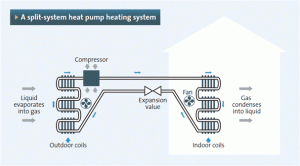if you share our passion, click here for further information
What is Air Conditioning and how does it work (the principle in brief)?
Temperature-controlled air at the touch of a button. There are seven key components to Air Conditioning systems – these include:-
 Indoor unit
Indoor unit- Outdoor unit
- Compressor / Heat Pump
- Expansion valve
- Condenser
- Evaporator
- Copper coil (housing coolant liquid)
The cooling process involves heat energy to be drawn from the air (Zone A) across a heat-exchanging copper coil containing refrigerant, which constantly circulates between both indoor and outdoor units. Under heat and compression, the refrigerant (gas) contained in the copper coil trades its heat across the condenser to the outside air (Zone B) and becomes super cooled refrigerant (liquid) under compression.
At this stage, the refrigerant is decompressed across an expansion valve and fed through an evaporator where it is reheated to a gas state – where the cycle begins once again and is continually repeated as desired. A reversed process is possible with the aid of a reversible valve (heat pump) – creating a heating system instead. Simple when you know how!
What is an Inverter?
To put it simply, this is a valve which enables the traditional role of an air conditioning unit to be reversed. Typically hotter air is drawn from an internal location and replaced with colder air. An inverter alternates the cycle and through use of a heat pump, draws in warmer external air to deliver internal heat. A standard air conditioning unit achieves the chosen temperature and switches off until the temperature drops sufficiently, which demands large fluctuations of costly electricity. Our inverter systems use intelligent electronics which allows the chosen temperature to be both achieved and maintained, requiring less electrical demand (saving between 40-50% electrical usage) and thus proving more economical.
What is a BTU rating?
BTU stands for British Thermal Unit – although this measurement is generally recognised worldwide. Consider a typical heating appliance; this is the amount of energy required to raise the temperature of 1 oz of water by 1 degree Fahrenheit. In air conditioning terms, it is the amount of thermal energy removed from an area during the cooling process. As 1 BTU is so nominal, air conditioning systems are measured in 1,000s of units – with the higher rating proving more effective (dependant upon the size and contents of the cooling zone).
HVAC, I have seen this abbreviation but what does it mean?
HVAC is a term commonly referred to in Industrial and Commercial circles (less so in domestic terms); short for Heating Ventilation and Air Conditioning. This is a scientific term to define the technology of internal environmental comfort.
Does air conditioning affect your health?
A well-maintained air conditioning unit will provide positive health benefits; which may be realised in terms of improved performance, energy and a reduction in sickness levels derived from airborne particles.
Humidity – A well-maintained air conditioning system will maintain approximately 50% water in the air. This will support those suffering from breathing difficulties and allergy sufferers.
Filtration – All our equipment comes with air filters as standard. These are essential to ensure quality in the air you breathe. Extracting harmful pollutants (i.e. smoke/odours), viruses and bacteria – filters form an essential component to your unit. If left untouched, a clogged filter could have an adverse effect on your health by recycling what had been previously extracted. Therefore it is important that air filters are replaced as part of ongoing maintenance of your system.
Draught & Noise – Nobody likes a draughty/noisy room; increasing health risks as well as providing unwanted and costly heat loss. All our systems are designed to reduce draught and noise levels, providing a cosy and affordable heated/cooled environment.
Ventilation – Stuffy and stagnant air in properties attributes to poor well-being. Without air conditioning, ventilation may be achieved by opening several windows to allow a passage of air to flow between windows. However the outside air quality may be reduced – inviting in pollutants from outside. An air conditioning system enables clean external air to be ventilated internally – while providing added security reassurance of a closed-window environment.
Contact Us



